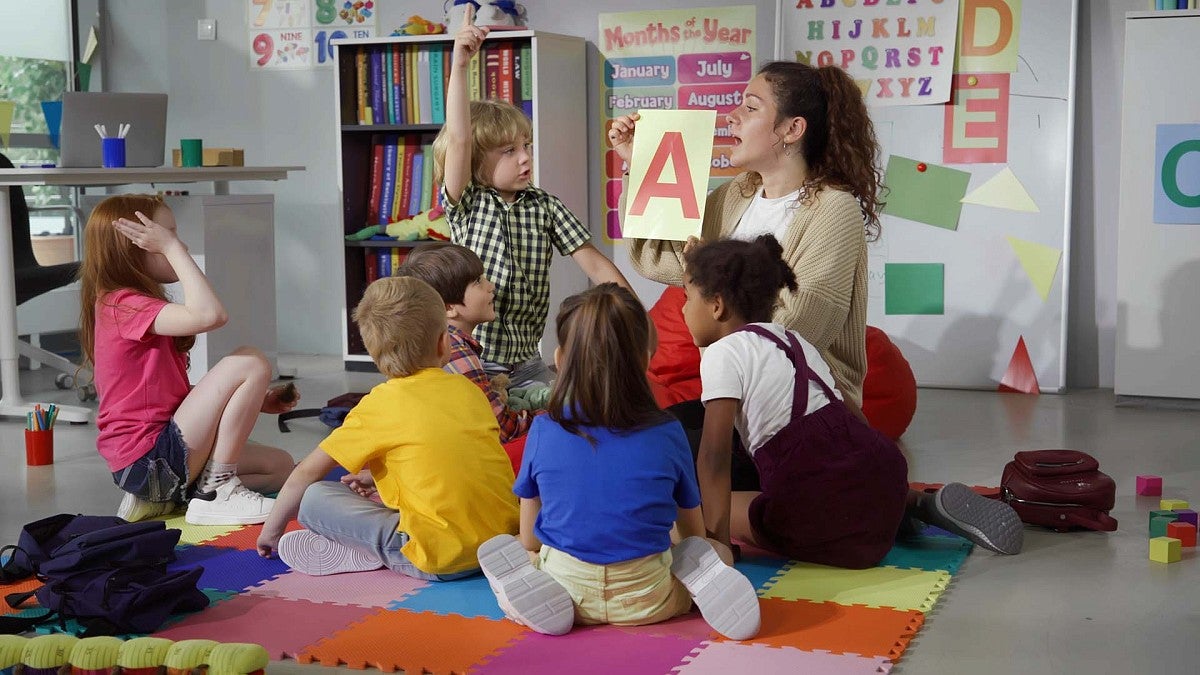A new multistate partnership led by a University of Oregon researcher will test a popular early learning program to see if it is as effective as anecdotal evidence has indicated.
The Early Learning Matters Curriculum, a free-of-charge, research-based program used in more than 2,800 classrooms worldwide, has a good track record for setting children on a path for academic success, but it lacks evidence-based analysis. Having that evidence is important because research shows that whether a child will graduate from high school or college can be predicted as young as 3 to 5 years old.
Past studies indicate that children who develop critical school readiness skills like literacy, math and self-regulation before beginning kindergarten are much more likely to succeed academically.

Now researchers will test the Early Learning Matters Curriculum’s efficacy in a multistate, five-year project led by Sara Schmitt, Bricker-Squires Faculty Chair in Early Intervention and an associate professor in the College of Education at the University of Oregon. She is working with research partners from Texas A&M, Purdue, Georgia State, Colorado State, Michigan State and Vanderbilt universities.
The work is supported by a nearly $4 million award from the Institute of Education Sciences. The institute is funding 92 percent of the total costs of the project, or $3,997,929, and the Early Learning Matters Academy at Purdue is funding 8 percent, or $350,000, through an in-kind donation of curriculum kits. The academy also is providing training and implementation support across the three study sites: Oregon, Texas and Georgia.
“Because ELM is freely accessible to all early care and education programs, it has the potential to increase equity in access to high-quality early learning opportunities for many children who may not have this kind of access otherwise,” Schmitt said.
Purdue University developed the Early Learning Matters Curriculum for the Department of Defense Child Development Program as part of the DoD-USDA Partnership for Military Families. However, the curriculum was designed to be used by any early-care and education program.
The curriculum targets eight foundational skills that research links with school and life success: language and literacy, mathematics, self-regulation, social-emotional competence, social studies, creative expression, science, and physical health.
The efficacy trial of the early learning program will include more than 600 children ages 3 to 5 in 132 preschool classrooms. The curriculum will be used in 72 of those classrooms, while 60 classrooms will serve as a “business-as-usual” control group.
The classrooms will include those in Head Start, public pre-K, community preschool programs, and laboratory school settings. Children in all classrooms will be pretested at the beginning of the school year and then post-tested after at least 36 weeks of instruction to measure gains in the foundational skills.
The curriculum is based on the most cutting-edge research on skill development and best practices for promoting school readiness. It also aligns with the accreditation standards of the National Association for the Education of Young Children. It was designed to be user-friendly and accommodate the realities of the early care and education workforce that includes staff with a range of educational and professional backgrounds.
“In the field of early childhood education, there is a lot of variation,” Schmitt said. “Many teachers in these preschool classrooms don’t have a degree in early education or they don’t have a lot of experience in the classroom. We’ve heard from teachers new to the field that ELM has helped them understand child development and feel like a professional.”
Schmitt’s Institute of Education Sciences award seeks to evaluate whether the early learning curriculum helps young children develop the skills they will need not only to succeed in school, but also later in life. Preschool children who develop strong executive function, or the mental processes that help a person set and achieve goals, are more likely to go to college.
Further, developing early mathematics skills makes it more likely a person will engage in a STEM career field later. The STEM fields are science, technology, engineering and math.
“There is a strong focus in ELM on self-regulation because children’s ability to begin to regulate their own behavior and reactions during the preschool period is a predictor not only of academic outcomes but also future socioeconomic outcomes like income,” Schmitt said. “The neuroscience literature tells us that our brains are incredibly malleable from ages 3 to 5. If we ignore the fact that we can have a profound impact by supporting skill development during this time, we have really missed an opportunity.”
—By Kelley Christensen, Office of the Vice President for Research and Innovation


